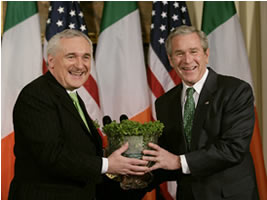(March 10 ,2007)
Good
morning. In times of war, Congress has no greater obligation than funding
our war fighters. And next week, the House will begin debate on
an emergency war spending bill.
The purpose of this legislation should be to give our troops on the front
lines the resources, funds, and equipment they need to fight our enemies.
Unfortunately, some in Congress are using this bill as an opportunity to
micromanage our military commanders, force a precipitous withdrawal from Iraq,
and spend billions on domestic projects that have nothing to do with the war on
terror. 
Our troops urgently need Congress to approve emergency war funds. Over the
past several weeks, our Nation has begun pursuing a new strategy in Iraq. Under
the leadership of General David Petraeus, our troops have launched a difficult
and dangerous mission to help Iraqis secure their capital. This plan is still in
its early stages, yet we're already seeing signs of progress. Iraqi and American
troops have rounded up more than 700 people affiliated with Shia extremists.
They've also launched aggressive operations against Sunni extremists. And
they've uncovered large caches of weapons that could have been used to kill our
troops. These are hopeful signs. As these operations unfold, they will help the
Iraqi government stabilize the country, rebuild the economy, and advance the
work of political reconciliation. Yet the bill Congress is considering would
undermine General Petraeus and the troops under his command just as these
critical security operations are getting under way.
First, the bill would impose arbitrary and restrictive conditions on the use
of war funds and require the withdrawal of forces by the end of this year if
these conditions are not met. These restrictions would handcuff our generals in
the field by denying them the flexibility they need to adjust their operations
to the changing situation on the ground. And these restrictions would substitute
the mandates of Congress for the considered judgment of our military commanders.
Even if every condition required by this bill was met, all American forces --
except for very limited purposes -- would still be required to withdraw next
year, regardless of the situation in Iraq. The consequences of imposing such an
artificial timetable would be disastrous.
Here is what Secretary of Defense Robert Gates recently told Congress:
Setting a fixed date to withdraw would "essentially tell [the enemy] how long
they would have to wait until we're gone." If American forces were to step back
from Baghdad before it is more secure, the scale and scope of attacks would
increase and intensify. A contagion of violence could spill out across the
entire country, and in time, this violence would engulf the region. The enemy
would emerge from the chaos emboldened with new safe havens, new recruits, new
resources, and an even greater determination to harm America. Such an outcome
would be a nightmare for our country.
Second, the bill would cut funding for the Iraqi security forces if Iraqi
leaders did not meet rigid conditions set by Congress. This makes no sense.
Members of Congress have often said that the Iraqis must step forward and take
more responsibility for their own security -- and I agree. Yet Members of
Congress can't have it both ways: They can't say that the Iraqis must do more
and then take away the funds that will help them do so. Iraq is a young
democracy that is fighting for its survival in a region that is vital to
American security. To cut off support for their security forces at this critical
moment would put our own security at risk.
Third, the bill would add billions of dollars in domestic spending that is
completely unrelated to the war. For example, the House bill would provide $74
million for peanut storage, $48 million for the Farm Service Agency, and $35
million for NASA. These programs do not belong in an emergency war spending
bill. Congress must not allow debate on domestic spending to delay funds for our
troops on the front lines. And Members should not use funding our troops as
leverage to pass special interest spending for their districts.
We are a Nation at war, and the heaviest responsibilities fall to our troops
in the field. Yet we in Washington have responsibilities, as well. General
Petraeus was confirmed by the Senate without a single vote in opposition, and he
and his troops need these resources to succeed in their mission. Many in
Congress say they support the troops, and I believe them. Now they have a chance
to show that support in deed, as well as in word. Congress needs to approve
emergency funding for our troops, without strings and without delay. If they
send me a bill that does otherwise, I will veto it.
Thank you for listening.
點(diǎn)擊進(jìn)入更多名人演講
(來(lái)源:http://www.weeklyradioaddress.com/
英語(yǔ)點(diǎn)津姍姍編輯)